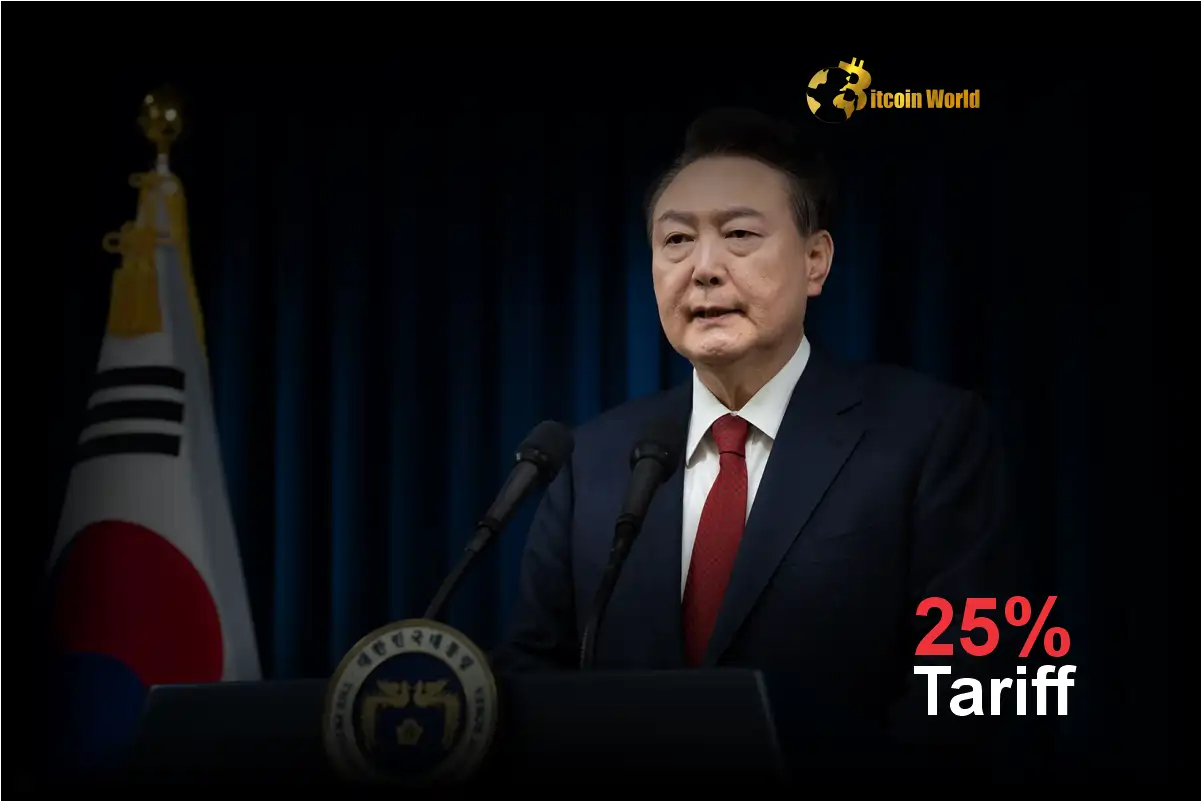Buckle up, crypto enthusiasts! The global economic landscape just got a whole lot more turbulent. In a move that has sent ripples through international trade circles, former U.S. President Donald Trump has announced a significant 25% tariff on Korean imports. This isn’t just a minor trade skirmish; it’s a bold declaration that could escalate into a full-blown trade war, and you know what that means for the volatile world of cryptocurrencies – potentially big changes ahead. Let’s dive into what this shocking development means for the crypto market and your digital assets.
Decoding the Shocking Trump Tariffs on Korean Imports
In a scene reminiscent of his previous term’s trade policies, Donald Trump, speaking from the Rose Garden, declared his intention to impose a hefty 25% tariff on goods flowing into the U.S. from South Korea. To put this into perspective, he cited existing tariffs from other major economies:
- China: 34%
- Japan: 24%
- European Union (EU): 20%
These figures, sourced from Walter Bloomberg’s X account, paint a picture of escalating global trade tensions. But why Korea? And more importantly, how does this connect to the crypto world we are so invested in?
Why Korean Imports? Understanding the Trade War Context
While the specifics behind targeting Korean imports weren’t explicitly detailed in the initial announcement, it’s crucial to understand this within the broader context of Trump’s ‘reciprocal tariffs’ approach. This policy essentially aims to level the playing field, or so it’s argued, by imposing tariffs on countries that are perceived to have higher tariffs on U.S. goods. Korea, a major exporter to the U.S., has likely been identified as a target in this strategy.
What does ‘reciprocal tariffs’ mean?
Reciprocal tariffs are essentially tariffs imposed by one country in response to tariffs imposed by another country. The idea is to create a balance or ‘reciprocity’ in trade relationships. However, in practice, these can often lead to escalating trade disputes and economic uncertainty.
Key Takeaways on Reciprocal Tariffs:
- Aim for Balance: Designed to encourage fairer trade by matching tariffs.
- Potential for Escalation: Can trigger retaliatory tariffs from other countries, leading to trade wars.
- Economic Impact: Can increase costs for consumers and businesses, disrupt supply chains, and impact economic growth.
How Do Trump Tariffs and Trade War Fears Impact the Crypto Market?
Now, let’s connect the dots to the digital asset realm. Why should crypto investors care about tariffs on Korean imports? Here’s the crucial link:
- Economic Uncertainty Fuels Crypto Demand: Trade wars create economic uncertainty. When traditional markets become volatile due to tariff disputes and potential slowdowns in global trade, investors often seek alternative assets. Cryptocurrencies, particularly Bitcoin, are increasingly viewed as a hedge against economic instability. In times of trade war anxieties, we often see a surge of interest in the crypto market as a safe haven.
- Currency Fluctuations and Crypto as an Alternative: Tariffs can lead to currency fluctuations. If the Korean Won or the US Dollar becomes unstable due to trade tensions, investors might turn to cryptocurrencies as a more stable store of value or a medium of exchange, especially in cross-border transactions.
- Supply Chain Disruptions and Decentralized Solutions: Trade wars can disrupt global supply chains. While seemingly unrelated, supply chain issues highlight the fragility of centralized systems. This can indirectly bolster the appeal of decentralized technologies, including blockchain and cryptocurrencies, which offer alternatives to traditional, centralized financial and logistical systems.
- Inflationary Pressures: Tariffs often lead to increased prices for imported goods, potentially causing inflation. As fiat currencies lose purchasing power due to inflation, investors may look towards deflationary assets like Bitcoin as a store of value, further driving interest in the crypto market.
Navigating the Crypto Market Amidst Economic Impact of Tariffs
So, what actionable insights can crypto investors glean from this tariff announcement? Here are a few points to consider:
- Monitor Market Volatility: Expect increased volatility in both traditional and crypto markets as the trade situation unfolds. Be prepared for price swings and adjust your trading strategies accordingly.
- Diversify Your Portfolio: Diversification is always key, but especially during times of economic uncertainty. Consider diversifying across different cryptocurrencies and asset classes to mitigate risk.
- Stay Informed on Global Economic News: Keep a close watch on developments in the trade war. News about tariff escalations or de-escalations can significantly impact market sentiment and crypto prices. Follow reputable news sources and analysts who provide insights into the intersection of global economics and crypto.
- Consider Long-Term Holds: If you believe in the long-term potential of cryptocurrencies as a hedge against economic uncertainty, consider adopting a long-term holding strategy, weathering short-term volatility for potential long-term gains.
Examples of Past Trade Wars and Crypto Reactions
History often provides valuable lessons. Let’s look at past instances of trade tensions and how the crypto market reacted:
| Event | Description | Crypto Market Reaction (General Trend) |
|---|---|---|
| US-China Trade Tensions (2018-2020) | Escalating tariffs between the US and China. | Increased interest in Bitcoin as a safe haven asset. Periods of crypto market growth coincided with peaks in trade war anxieties. |
| Brexit Uncertainty (2016-2020) | Prolonged uncertainty surrounding the UK’s exit from the EU. | Some analysts noted a correlation between Brexit-related economic anxieties and Bitcoin price increases, suggesting a flight to alternative assets. |
These examples are not definitive proof of a direct causal link, but they do suggest a pattern: economic uncertainty, often fueled by trade tensions, can be a catalyst for increased interest and investment in the crypto market.
Conclusion: Brace for Change in the Crypto Landscape
Donald Trump’s 25% tariff on Korean imports is more than just a trade policy; it’s a potential tremor that could reshape the global economic order and, consequently, the crypto market. As trade wars loom and economic uncertainty rises, cryptocurrencies may find themselves in a unique position – not just as speculative assets, but as increasingly relevant alternatives in a world grappling with traditional economic challenges. For crypto investors, staying informed, being adaptable, and understanding the broader economic context is now more critical than ever. The crypto landscape is dynamic, and global events like these tariffs serve as powerful reminders of the interconnectedness of the world economy and the digital asset space.
To learn more about the latest crypto market trends, explore our article on key developments shaping Bitcoin price action.






